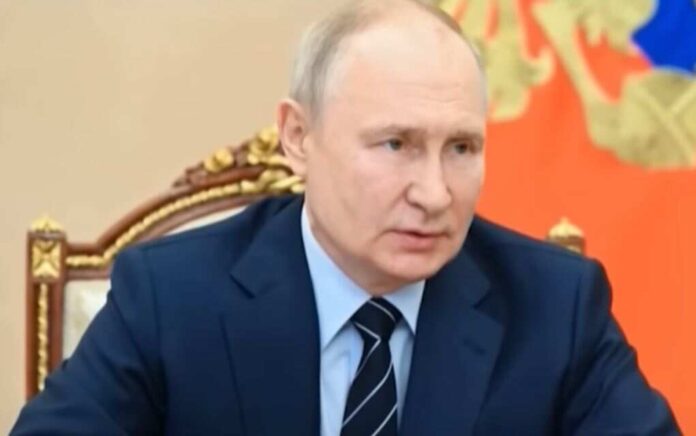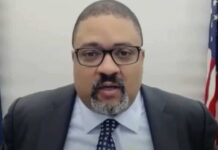
Everyone wants to know what President Biden’s next move in the Ukraine-Russia war is. It may not be what you expected.
Because Joe Biden’s made this huge decision about the Ukraine-Russia war that changes everything.
After months of resistance from the Pentagon, President Joe Biden has ordered the United States to begin sharing information on Russian war crimes with the International Criminal Court (ICC).
The president’s decision was reported by officials to the New York Times on Wednesday. The U.S. military was apprehensive about the warming connection between the United States and the International Criminal Court (ICC), which was established to examine war crimes, genocide, and crimes against humanity, despite the fact that the State and Justice Departments backed the move. Atrocities committed in the Balkans and Africa have been brought to justice by this organization.
The Pentagon was concerned that the increased cooperation could eventually result in the investigation and conviction of American forces. While this may be true in theory, experts have pointed out that the United States already has a judicial system in place to conduct investigations and holds its own soldiers accountable. John Bellinger, who served in the Bush administration on the National Security Council and the State Department as a lawyer, made this very point to the Times, calling Biden’s action “the right thing to do.”
The United States, like Russia, has not signed the Rome Statute that established the International Criminal Court. Although Bill Clinton signed the deal initially, he never submitted it to the upper chamber of Congress for confirmation, and George W. Bush subsequently gave notice of the United States’ withdrawal.
Cooperation grew during Bush’s second term and then Obama’s, but it broke down in 2017 after the International Criminal Court launched a probe into the Afghanistan warfare and was punished by the United States. Since then, both sides have made efforts to mend fences, with the ICC’s head prosecutor withdrawing the investigation and sanctions being lifted.
The annexation of Ukraine solidified the connection, and as soon as the war began, lawmakers have made it clear they want the executive branch to maintain open lines of communication with the judiciary. A Senate committee has cleared a funding bill that includes a language declaring that the president “shall provide information” to the court about Russian war crimes. In December, Congress lifted the restrictions it had established against providing help to the court, restrictions that had been put in place soon after the Rome Statute had been ratified.
Robert Menendez (D., N.J.), chairman of the Senate Foreign Relations Committee, wrote to Secretary of State Antony Blinken last week to explain that Congress’s intent to cooperate with the ICC was crystal clear in the 2023 omnibus and that “the Department of Defense has expressed unjustified reservations about such cooperation.”
In a letter to Vice President Biden sent in April, Senators Lindsey Graham (R-SC) and Dick Durbin (D-IL) argued that, while the Ukrainian people need “our weapons, humanitarian assistance, and support for their government,” they also require “American leadership on accountability for those who have perpetrated atrocities against them.”
Graham and Durbin issued a statement of support on Wednesday. They added, “The United States will not tolerate these horrific crimes,” and said they were relieved that the government was finally backing the ICC’s investigation after months of pressure.
In April, members of the House Foreign Affairs Committee heard from the Ukrainian prosecutor general and victims of the thousands of war crimes committed against Ukrainians. Civilians were murdered, torture chambers were set up, and Ukrainian children were kidnapped and re-educated. Prosecutor General Andriy Kostin stated that de-occupied regions are producing an exponentially increasing amount of evidence. For instance, the Ukrainian government has uncovered bank documents that trace the torture facilities back to Russian intelligence services.
Regularly, civilian infrastructure and cultural heritage sites are targeted in indiscriminate shelling. Russian arsonists struck again this week, destroying a cathedral in Odesa that Stalin had already leveled.
Odesa’s main Orthodox cathedral. Established in 1794, destroyed by Stalin in 1936, rebuilt under an independent Ukraine and destroyed again by Putin in 2023. One of several historical parts of central Odesa, a UNESCO world heritage site, hit by Russian missiles strikes today. pic.twitter.com/X9BvICUbQ4
— Yaroslav Trofimov (@yarotrof) July 22, 2023
During an April speech, Attorney General Merrick Garland remarked that the United States had a “very long memory.” U.S. atrocities that fall under U.S. criminal jurisdiction are being investigated by the DOJ’s War Crimes Accountability Team. The ICC, however, covers a considerably wider range of issues.
It is believed that American spies have information on Russian government plans to target civilian infrastructure and forcefully transfer thousands of youngsters from Ukraine. Prosecutors in Ukraine have seen some of this evidence, but the International Criminal Court has not.
In connection with the kidnapping and reeducation of Ukrainian children, the ICC has already issued high-profile accusations and arrest orders against Russian President Vladimir Putin and Maria Lvova-Belova, Russia’s commissioner for children’s rights.
But the ICC’s measures did not faze Putin in the least. Defiantly, he went to an art school and a children’s center in occupied Crimea a few days later.
The United States is not only investigating possible war crimes but is also taking further legal action against Russia. The U.S. Department of Justice has been given permission by Congress to distribute assets confiscated from Russian oligarchs to be used in the reconstruction of Ukraine. Task Force KleptoCapture is an international coalition that has been prosecuting and seizing assets from people who have helped the Russian government and military.
The Wagner Group has been designated as a foreign terrorist group by Ukraine, but the United States has so far refused to do so. What this organization will do in the wake of the insurrection its leader, Yevgeny Prigozhin, organized against Russia’s defense infrastructure is uncertain. However, there are persistent efforts to freeze the organization’s assets and cut off its funding.



















